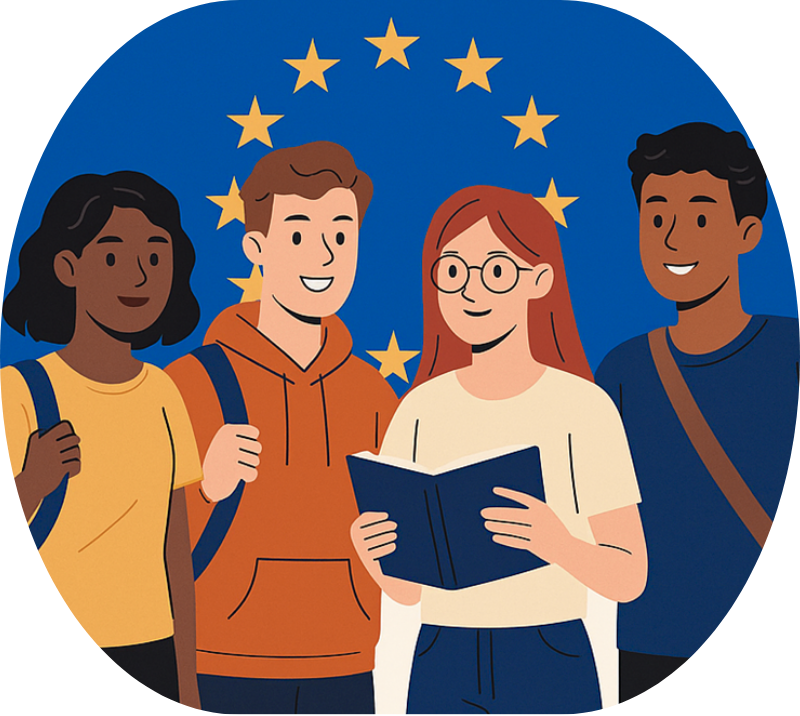
Image created with DALL-E
In a rapidly changing world, where democratic values, mobility, and digital participation are more relevant than ever, understanding what it means to be a citizen is vital. For over 400 million people living in the European Union, EU citizenship is more than a legal formality: it is a framework of rights, responsibilities, and possibilities that shapes the everyday lives of Europeans particularly the young.
EU citizenship was formally established by the Maastricht Treaty in 1992. It is not a substitute for national citizenship, but rather a complementary status automatically granted to anyone who holds the nationality of an EU member state. This means that a young Italian, Latvian, or Portuguese citizen is also a citizen of the European Union, with all the benefits and obligations that this implies.
One of the most significant advantages of EU citizenship is the right to move, live, study, and work freely within the borders of the Union. For young people, this opens countless doors: access to study abroad programs, internships, jobs, and cultural exchanges that would be unthinkable without this shared legal and political space. Initiatives such as Erasmus+, the European Solidarity Corps, and cross-border volunteering and training schemes allow young people to broaden their horizons, both professionally and personally, while fostering a deeper understanding of European diversity and unity.
However, EU citizenship is not only about mobility or access to opportunities, it is also about participation and protection. Young EU citizens have the right to vote and stand as candidates in municipal and European Parliament elections, even if they reside in another member state. They can petition the European Parliament and receive diplomatic protection from other EU countries if their own nation is not represented abroad. These rights reflect the EU’s foundational commitment to democratic engagement and individual dignity.
At the same time, the EU guarantees a high standard of protection in areas that directly impact the younger generation, including consumer rights, environmental standards, digital privacy, and anti-discrimination policies. Regulations like the General Data Protection Regulation (GDPR) ensure that citizens’ data and identity are respected across the digital space. Initiatives for sustainability and equality—such as the European Green Deal, gender equity directives, and LGBTQ+ inclusion strategies aim to build a Union where young people can thrive, express themselves freely, and act responsibly.
Yet, despite the breadth of benefits and protections, many young Europeans are still unaware of the full extent of their EU citizenship. In an era where misinformation, political apathy, and extremism are on the rise, this knowledge gap can have real consequences. That is why civic education and media literacy are essential, helping the next generation to understand how institutions like the European Commission, Parliament, and Council work together to create and enforce laws that affect all citizens.
EU citizenship empowers youth to engage with European values, not only by enjoying their rights but also by contributing to the community. It encourages informed debate, cross-cultural understanding, and active civic responsibility. By participating in democratic processes, defending human rights, and acting for sustainability, young people become not just beneficiaries of the European project, but its most vital stakeholders.
Understanding and embracing EU citizenship means understanding that Europe is not only a place, it is a shared vision. For today’s youth, this identity offers a sense of belonging, a toolkit for global challenges, and an invitation to shape the future of a democratic, inclusive, and united Europe.
Sources